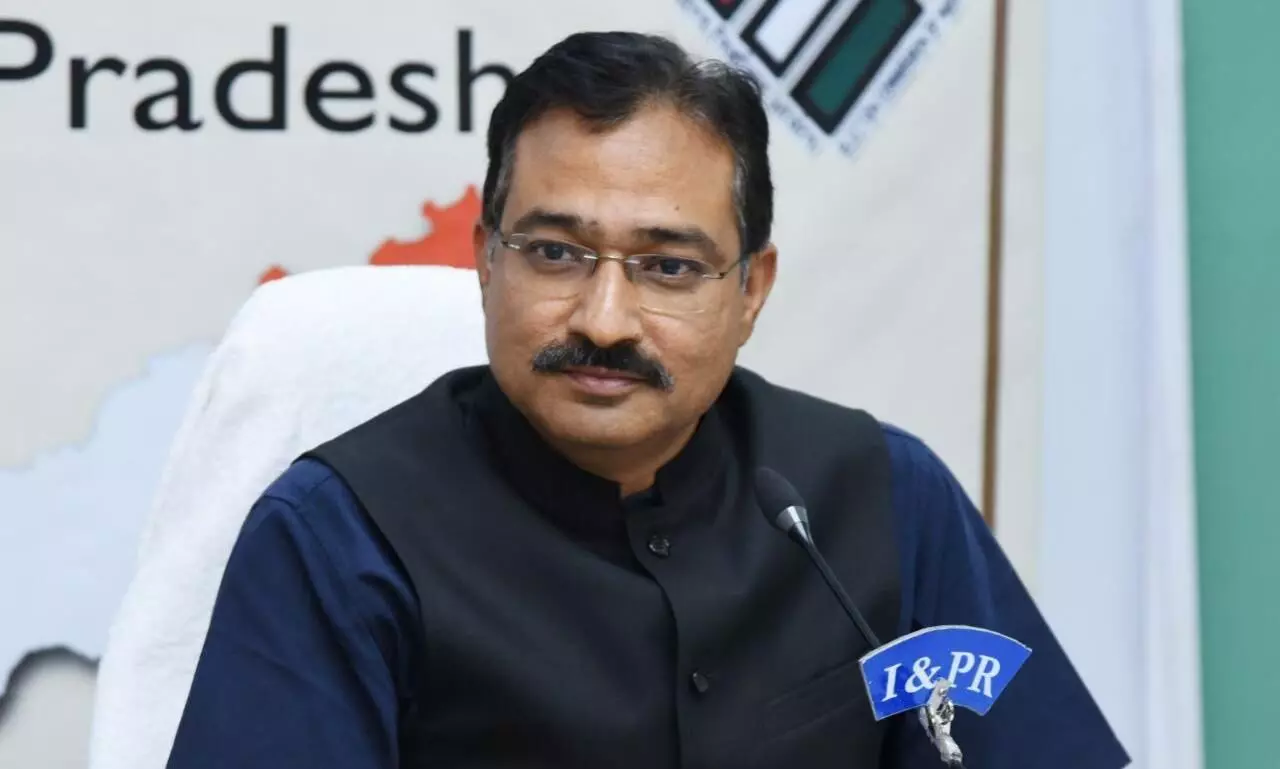EC strives to negate 'urban voter apathy' in Andhra Pradesh
The EC is striving to increase the polling percentage in about 20 urban Assembly constituencies where it is lower than the national average of 68 percent
By Newsmeter Network
Chief Electoral Officer Mukesh Kumar Meena.
Amaravati: Andhra Pradesh Chief Electoral Officer (CEO) Mukesh Kumar Meena said the Election Commission is striving to increase the polling percentage in about 20 urban Assembly constituencies where it is lower than the national average of 68 percent.
Visakhapatnam, Nellore, Kurnool town, Rajamahendravaram, Vijayawada and others are some of the constituencies ‘exhibiting urban apathy’ towards exercising the franchise.
“Our (overall) per cent of polling is on the higher side at 79 per cent, but still there are certain urban areas where it is below the national average. We are now trying to increase the percentage in these places so that our overall voting percentage also goes up. We appeal to the people to vote,” said Meena in a PTI interview.
EVMs ready:
He noted that the poll body has done all the planning needed to conduct the elections, such as keeping the required number of Electronic Voting Machines (EVMs) ready and also completing first level checks.
For manning 46,000 polling stations in the southern state’s simultaneous Legislative Assembly and Lok Sabha polls on May 13, Meena said the Commission took the list of employees, considering it needs 3.3 lakh employees just for the poll duty.
According to the CEO, each polling station requires six polling officers, including the presiding officer. There is a “little gap in the requirement” he said and exuded confidence that it can be covered by rationalisation.
On the preliminary preparation plan for deployment of forces in all the polling stations, the official said it has been completed and the final exercise will be approved by the general observer.
Recently, the poll panel appointed three retired bureaucrats as special observers to ensure the implementation of its guidelines and enforcement in the forthcoming elections.
Special officers appointed:
Ram Mohan Mishra, a retired 1987 batch IAS officer has been appointed as the special general observer, Deepak Mishra, a retired 1984 batch IPS officer as special police observer and Nina Nigam, a retired 1983 batch IRS officer as special expenditure observer.
“They will come to the districts and then they will go through the deployment plan and approve. From our side, we have completed the exercise as required for force deployment,” said Meena.
The CEO has estimated the requirement of up to 1.14 lakh police personnel, who also include home guards for queue management and maintaining law and order.
However, only 50,000 police personnel are available in the state, prompting the CEO to put forth the requirement of 430 CRPF companies. Each company comprises 80 to 85 Central Armed Police Force (CAPF) personnel.
As there would still be some more gap in the required number of security forces, Meena said personnel from the uniformed services within the state and police department from neighbouring states would also be tapped.
Uniformed services include departments such as vigilance and enforcement, Anti-Corruption Bureau (ACB), Forest, Transport Excise and others.
Left-Wing affected areas:
For the 2019 general elections, he said police personnel from neighbouring states such as Odisha, Karnataka and Tamil Nadu were mobilised.
Only one district, Alluri Sitarama Raju, falls under the category of Left Wing Extremism (LWE) affected, where 940 polling stations come under this category.
In addition to the measures taken by the police department for LWE affected areas, security arrangements will be intensified three times more in these polling stations when compared to normal polling stations to ensure the safety of EVMs, strong rooms and counting centres.
Polling stations in LWE-affected areas will be manned by one section of police, eight to nine personnel, when compared to just half a section of police in non-LWE areas, he added.
Strong rooms and counting centres in non-LWE affected pockets are manned by three to four sections of CAPF whereas in LWE hit areas they will be guarded by one company of CAPF.
Menace of paid news:
Referring to the menace of paid news, the top election official said it is tracked for any respective candidate, along with his expenditure from the day he or she files their nomination.
The Election Commission has set up a media cell to continuously monitor adverse news and complaints to address the challenges emanating from social media.
In the event of any political leader violating the Model Code of Conduct (MCC) by making unverified allegations, personal attacks on opponents or derogatory and defamatory statements, Meena said the Election Commission has mandated that a notice be issued when the source is identifiable.
In case the source is unidentifiable, the matter will be escalated to the Election Commission, which will require the social media platform’s administrator to remove that post. Incidentally, Meena said several such actions have already been taken.
Material seizures:
Besides the seizure of cash, liquor, precious metals and inducements worth Rs 157 crore from January 1 to March 16, he said another Rs 16 crore worth seizures have been made in the past fortnight.
He pointed to complaints on inducements being received on cVigil app and other platforms and said inducements have been seized from the ruling YSRCP and opposition TDP also.
Among the seized material, the CEO emphasised that all publicity material of political parties which has been legally accounted for is allowed but not inducements.
Publicity material can include caps, scarves, flags, banners and others.
As of March 27, except for polling officers, he said training for all others has been completed.
Elections for the 175-member Assembly and 25 Lok Sabha seats in Andhra Pradesh are scheduled on May 13 and counting of votes is slated for June 4.
Inputs from PTI